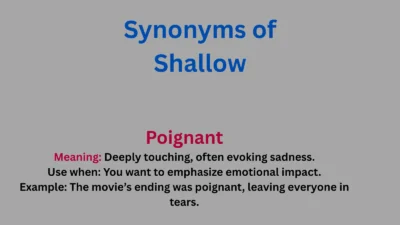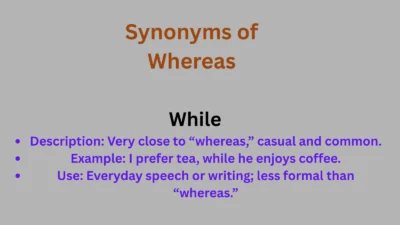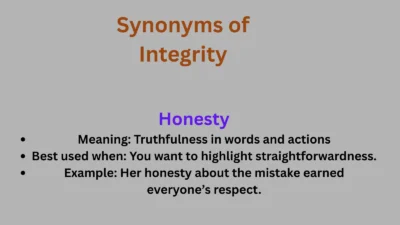Ever come across the word “shallow” and wonder if there’s a better way to say it? Whether you’re describing a person who lacks depth, a body of water, or even a conversation that feels empty, shallow is a word we use in many different contexts. But when you need variety or more precision, turning to the right synonyms of shallow can make all the difference.
In this guide, we’ll explore the most useful, expressive, and accurate synonyms of shallow, complete with meanings, usage tips, and example sentences. If you’re writing creatively, speaking formally, or just expanding your vocabulary, this list will help you say more with confidence.
We’ll cover both literal and figurative meanings so you can choose the right word every time. From surface-level to superficial, you’ll discover how each shallow synonym paints a slightly different picture.
Understanding Shallow: Key Nuances
- Literal: Not deep (e.g., a shallow pool)
- Figurative: Superficial or lacking depth in thought, emotion, or character
- Tone: Can be neutral, negative, or descriptive depending on usage
- Emotional undertone: Sometimes implies a lack of seriousness, insight, or emotional engagement
Synonyms of Shallow with Examples and Usage Tips
1. Superficial
- Meaning: Concerned only with the obvious or surface-level
- Example: Her knowledge of the subject was superficial at best.
- Use when: You want to highlight a lack of depth or thoroughness in thinking or feeling.
- Tone: Neutral to negative
2. Skin-deep
- Meaning: Only on the surface, not profound
- Example: His charm was skin-deep and didn’t last long.
- Use when: Referring to appearances or qualities that don’t go beyond the surface.
- Tone: Slightly informal, mildly critical
3. Frivolous
- Meaning: Not serious, carefree in a trivial way
- Example: They spent the evening on frivolous gossip.
- Use when: Emphasizing triviality or lack of seriousness.
Tone: Negative, often playful
4. Cursory
- Meaning: Hasty and therefore not thorough or detailed
- Example: She gave a cursory glance at the report before the meeting.
- Use when: Describing quick, superficial attention or examination.
- Tone: Neutral to mildly negative
5. Surface-level
- Meaning: Only on the surface, without depth
- Example: The analysis was surface-level and didn’t address core issues.
- Use when: Explicitly referring to the outermost layer of something abstract.
- Tone: Neutral
6. Empty
- Meaning: Lacking real meaning or value
- Example: His promises felt empty and insincere.
- Use when: Highlighting a lack of substance or sincerity.
- Tone: Negative, emotional
7. Trivial
- Meaning: Of little importance or value
- Example: They argued over trivial details instead of focusing on the main problem.
- Use when: Emphasizing insignificance or unimportance.
- Tone: Neutral to negative
8. Flimsy
- Meaning: Weak or insubstantial
- Example: The evidence was flimsy and didn’t convince the jury.
- Use when: Describing things that lack strength or solidity, literal or figurative.
- Tone: Negative
9. Vapid
- Meaning: Offering nothing stimulating or challenging
- Example: The conversation was vapid and dull.
- Use when: Criticizing dullness or lack of interest.
- Tone: Negative, intellectual
10. Feeble
- Meaning: Weak, lacking strength or effectiveness
- Example: His feeble attempt at humor fell flat.
- Use when: Referring to weakness or ineffectiveness.
- Tone: Negative, often sympathetic
11. Insubstantial
- Meaning: Lacking strength or solidity
- Example: The argument was insubstantial and easy to refute.
- Use when: Describing ideas, evidence, or things lacking weight.
- Tone: Neutral to negative
12. Petty
- Meaning: Of little importance, often with a negative, mean-spirited connotation
- Example: Don’t get caught up in petty squabbles.
- Use when: Criticizing triviality combined with pettiness or meanness.
- Tone: Negative
13. Puny
- Meaning: Small, weak, insignificant
- Example: His puny efforts couldn’t change the outcome.
- Use when: Emphasizing weakness or insignificance.
- Tone: Negative, sometimes playful
14. Narrow-minded
- Meaning: Not willing to consider different ideas or opinions
- Example: His narrow-minded views limited his understanding.
- Use when: Highlighting intellectual or emotional shallowness caused by bias.
- Tone: Negative, critical
15. Meager
- Meaning: Lacking in quantity or quality
- Example: She received meager praise for her hard work.
- Use when: Describing insufficient or inadequate qualities.
- Tone: Neutral to negative
16. Limited
- Meaning: Restricted in range or capacity
- Example: His knowledge was limited to basic facts.
- Use when: Emphasizing a lack of breadth or depth.
- Tone: Neutral
17. Modest
- Meaning: Moderate or limited in size or quality; humble
- Example: She made a modest contribution to the project.
- Use when: Describing limited extent without negative judgment; also about humility.
- Tone: Neutral, often positive
18. Reserved
- Meaning: Slow to reveal emotions or opinions
- Example: He was reserved in his comments during the discussion.
- Use when: Describing emotional or social modesty, not lack of depth.
- Tone: Neutral, respectful
19. Timid
- Meaning: Showing a lack of courage or confidence
- Example: Her timid response suggested she wasn’t comfortable.
- Use when: Emphasizing shyness or hesitancy.
- Tone: Neutral, sometimes sympathetic
20. Coy
- Meaning: Pretending to be shy or modest, sometimes playfully
- Example: She gave a coy smile when complimented.
- Use when: Describing flirtatious or playful modesty.
- Tone: Neutral to positive
21. Superficial (Emotional)
- Meaning: Emotionally shallow or not genuine
- Example: Their friendship felt superficial and forced.
- Use when: Criticizing emotional depth specifically.
- Tone: Negative
22. Cynical
- Meaning: Distrustful of others’ sincerity or goodness
- Example: His cynical attitude made it hard to trust his words.
- Use when: Emotional shallowness mixed with distrust.
- Tone: Negative, intellectual
23. Flighty
- Meaning: Unstable or inconsistent in behavior or emotions
- Example: She was too flighty to hold a steady job.
- Use when: Emphasizing lack of seriousness or depth in personality.
- Tone: Negative, informal
24. Airy
- Meaning: Light, not serious or heavy
- Example: Their conversation was airy and lighthearted.
- Use when: Describing a carefree, superficial tone.
- Tone: Neutral to positive
25. Lightweight
- Meaning: Lacking in importance or substance
- Example: The film was criticized as a lightweight comedy.
- Use when: Emphasizing lack of seriousness or complexity.
- Tone: Informal, mildly negative
26. Unsubstantial
- Meaning: Not solid or real; lacking substance
- Example: The claims were unsubstantial and easily dismissed.
- Use when: Describing weak or flimsy arguments or things.
- Tone: Neutral to negative
27. Vacant
- Meaning: Empty, lacking thought or expression
- Example: He had a vacant stare during the lecture.
- Use when: Referring to mental or emotional emptiness.
- Tone: Negative, descriptive
28. Featherweight
- Meaning: Very light or insignificant
- Example: The debate was featherweight compared to real issues.
- Use when: Emphasizing lightness or triviality.
- Tone: Informal, mildly negative
29. Unreflective
- Meaning: Not thoughtful or contemplative
- Example: Her unreflective comments showed a lack of insight.
- Use when: Describing a lack of mental depth or consideration.
- Tone: Neutral to negative
30. Fleeting
- Meaning: Lasting for a very short time
- Example: Their happiness was fleeting but sweet.
- Use when: Emphasizing brevity rather than depth; can relate to emotions or experiences.
- Tone: Neutral, often poetic
How to Choose the Right Synonym for Shallow
- Consider the context: Are you describing literal depth, emotional depth, intellectual depth, or seriousness?
- Tone matters: Do you want to sound neutral, critical, playful, or sympathetic?
- Emotional color: Words like vapid or feeble carry a stronger negative tone; modest or reserved are gentler.
- Cultural nuances: Some words, like coy are culturally specific and often linked to flirtation or social behavior.
- Formality: Words like cursory or insubstantial work well in formal writing, while flighty or lightweight are more informal.
Conclusion
Expanding your vocabulary around the word shallow lets you express subtle differences in meaning, tone, and emotion. Whether you want to describe superficial knowledge, emotional distance, or modesty, there’s a synonym to suit your needs.
By understanding each shallow synonym’s nuance and context, you can make your writing clearer and more engaging, choosing just the right word to capture the precise shade of “shallowness” you want to convey.
Next time you think of shallow, try one of these alternatives to add variety and depth to your language!




